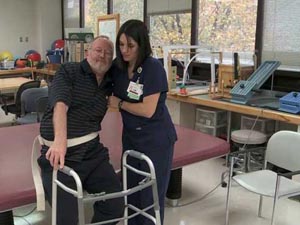Mike Jezdimir has been fighting transverse myelitis (TM) since 1967 when the rare spinal cord disease paralyzed the 17-year-old. It has been a battle with many ups and downs. Now that he has created the Mike L. Jezdimir Transverse Myelitis Foundation to raise money to support spinal cord research at the University of Alabama at Birmingham (UAB) the 62-year-old can point to another high point in that fight.
 TM is a rare inflammatory disease causing injury to the spinal cord. Attacks of inflammation can damage or destroy myelin, the fatty insulating substance that covers nerve cell fibers. This damage causes nervous system scars that interrupt communications between the nerves in the spinal cord and the rest of the body.
TM is a rare inflammatory disease causing injury to the spinal cord. Attacks of inflammation can damage or destroy myelin, the fatty insulating substance that covers nerve cell fibers. This damage causes nervous system scars that interrupt communications between the nerves in the spinal cord and the rest of the body.
TM occurs in adults and children, and peak incidence rates occur between the ages of 10-19 and 30-39 years. Approximately one-third of those with TM get better and return to their baseline. Another third will have some changes to their body that will affect them the rest of their life. The final third are left with some type of permanent disability.
Jezdimir’s TM struck between the C5 and C6 vertebra, leaving him initially paralyzed. He spent a month in a hospital unable to move, and he vowed to fight and overcome the disease. He learned to walk again with the aid of a cane and crutches. He earned a college degree and enjoyed a career as a draftsman, rising to become the director of engineering for a major corporation. He married and has two sons and three grandchildren.
|
“I’m going to walk again,” said Jezdimir. “With the aid of my wonderful family and friends, I feel certain that this is just one more obstacle that I will overcome. We feel confident that by working with the scientists, researchers and rehabilitation experts at UAB, one day we will be free from a disease that is so traumatic on patients and families.” |
With his wife’s support, he took up tennis, bowling and even golf. But walking has again become a challenge, and he uses a motorized scooter.
“I’m going to walk again,” said Jezdimir. “With the aid of my wonderful family and friends, I feel certain that this is just one more obstacle that I will overcome. We feel confident that by working with the scientists, researchers and rehabilitation experts at UAB, one day we will be free from a disease that is so traumatic on patients and families.”
TM work is done at UAB by twelve researchers in eight disciplines: rehabilitation, cell/developmental/integrative biology, neurology, psychiatry/behavioral neurobiology, neurobiology, microbiology, neuropathology and clinical immunology/rheumatology.
“There are a number of exciting, novel research projects under way at UAB,” said Candace Floyd, Ph.D., associate professor and director of research in the Department of Physical Medicine and Rehabilitation. “Some involve controlling inflammation or a better understanding of the signaling pathways that contribute to inflammation. Others involve recovery or repair of the myelin sheath. The Jezdimir TM Foundation will be an important component in driving this research forward.”
As the foundation raises awareness about TM and builds on its mission of hope, it will host its first fundraising event, a 5K run and fun run on April 13, 2013. The run will begin at 7:30 a.m. at Veterans Park in Alabaster, AL. Register for the event online.
Jezdimir believes the foundation will have a profound effect on better understanding of TM and potential therapies for the disease.
He believes its creation will help him to accomplish his most treasured goal.
“I’d like to walk hand in hand down the street with my wife, Lou Ann,” he said. “I’m confident we’re on the right track.”
